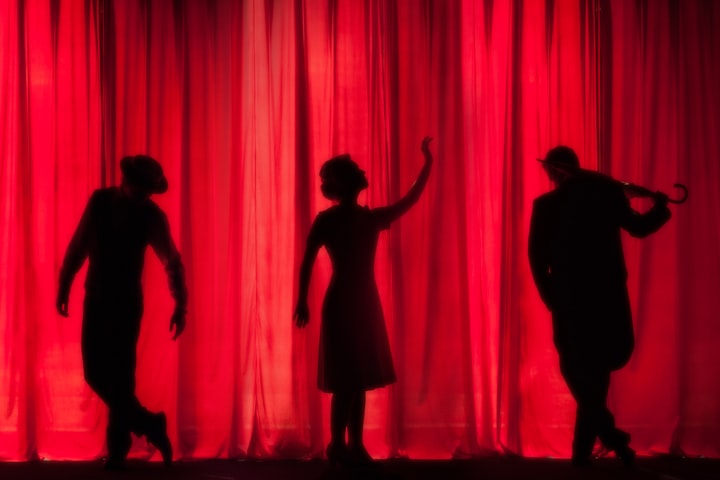The Art of Improvisation.
Thoughts on a lesser-known form of acting.
Google provides the following definition to improvisation: "Something that is improvised, in particular a piece of music, drama, etc. created spontaneously or without preparation." There is nothing wrong with this description but it is a bit light when it comes to capturing the art of improvisation. Yes, I used the word "art". The five years that I spent improvising with a French team in London have convinced me that improvisation has carved a very distinct place of its own in the league of performing arts. This opinion might spark some debate but it is not the purpose of this article.
For the sake of clarity, this my own definition of improvisation as a performing art: "The use of one's unique mix of personality, experiences, energy, emotional intelligence and physicality to create scenes and stories out of thin air. The unpredictable nature of improvisation means that the outcome of the scenes can never be guessed and, to some extent, even replicated. Drama and comedy are like fire and ice wrestling each other on a tightrope a thousand feet above the ground while the spectators eagerly wait for the conclusion of this duel."
The definition above was improvised but the lessons below were not. They are the result of concrete observations and stage performances over a long period of time. These lessons reflect my own understanding of improvisation and what can help create a rewarding journey in this performing art. All experiences are different but I believe that these lessons will never go out of style.
1. Intensity beats extensity.
Short-form improvisation rarely lasts for more than five minutes. Long-form is a different beast and can go on for hours. I am trained in short-form so this is what I will focus on. My key point is this: a team of improv artists looking to awe spectators cannot afford to bring anything less than 100% to the stage. There is not enough time in short-form to "warm up" a story before reaching a grand finale. The commitment to each character that each improv artist has decided to play must be very strong. If the artist wants to be a pilot, a sorcerer, a superhero, a postman, a barman, an object...absolutely anything really, he or she has to be fully in this role right from the beginning. The aim is to start strong and to finish strong. It's like shooting an arrow. You want to be in that lapse of time where the speed of the arrow is at its peak so that it will not deviate from its target. This is easier said than done which is why an improv artist must have a clear understanding of his or her state of mind before stepping on stage. Fatigue, stress, distracting thoughts...these negative factors will hinder the ability to own the characters that will be played. Since nothing is scripted, everything will depend on the artist's immediate creative energy and the support of his or her teammates.
2. Individual brilliance means nothing if the team does not operate as a single unit.
Believe it or not, but being alone on stage is easy. You only have to look after yourself and gradually make the necessary adjustments to become comfortable with the situation at hand. Working with a team on stage is a different challenge and one that requires constant work. The true magic of an improvisation show comes from seeing a group of people perfectly complementing each other to produce a creative moment that would not have been possible with an individual performance. For this reason, the relationships among improv artists, both on and off the stage, will play a bigger role than any artistic talent. A good team will understand this and will seek to eliminate conflicts and misunderstandings that can potentially leak on stage. Most improvisation scenes will require the presence of at least two performing artists. Trust is the bridge that will convert their individual abilities into something bigger. Take that away and all you have left are two people existing in two separate worlds within the same space. It would be like watching two one-man shows at the same time.
3. Radically different personalities make the best teams.
The worst thing that can happen to a show of any kind is for it to be described as boring. No self-respecting artist wants to be labeled as such. Boring usually means that the quality and evocative power of a show or artwork have both reached a dead-end. This is to be avoided at all costs. In the case of an improvisation team, a very efficient way to mitigate this risk is to gather individuals who are as different as they are complementary. People that are cut from the same cloth produce predictable results but mixing various personalities leads to surprising outcomes. The difficulty of course will come from establishing a common foundation on which they can all perform together with their unique strengths. This requires a fair degree of open-mindedness but the results are often worth it. Personalities are like chemical agents. Mixing two or more will produce different results. Some will be neutral while others will be explosive. Each member of an improvisation team is a chemical agent in his or her own right whose properties will produce the greatest effect when associated with the right elements. It is safe to do so as long as the stage does not explode.
Improvisation is still very young compared to other performing arts and is still relatively unknown. There is no equivalent of Shakespeare or Molière in improvisation and it is perhaps how it should be since this art is always changing and always adapting. Being a martial artist, I am tempted to associate theater with Shotokan Karate and improvisation with Jeet Kune Do. The former is traditional while the latter is unconventional.
Enjoy your next Improv Show.
Ashley Boolell | www.ashleyboolell.com








Comments
There are no comments for this story
Be the first to respond and start the conversation.